by Tanya Michele Amador and Hafiiz Karim
Bangkok has a long tradition of arts and culture and a diverse contemporary arts scene that continues to grow, as the city takes its place on the global stage. Our cohort from the MA Asian Art Histories Programme went on a study trip to Bangkok, Thailand from 10 to 14 December 2018. The highlight of the trip was the Bangkok Art Biennale (BAB). The BAB featured more than 75 artists and groups from 34 countries (about half from Thailand) across twenty venues. Titled Beyond Bliss, it was led by chief executive and artistic director Apinan Poshyananda.
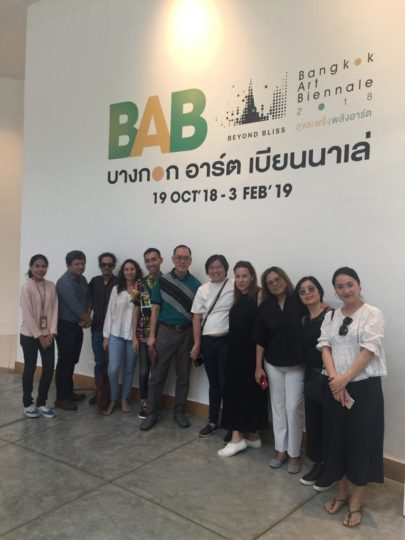
Our cohort at the Bangkok Art Biennale (BAB)
Probably the most exciting part of any art trip is a visit to the artist’s studio. These memorable close encounters offer the most insightful and meaningful understanding of an artist’s oeuvre. On this excursion, we had the pleasure to visit several studios. Our tour began with a visit to the studio of Pinaree Santipitak, a Thai conceptual artist best-known for her breast stupas that embody themes of motherhood, and femininity. In her studio, Pinaree enlightened us with her creative process and highlighted how the human senses are crucial to the overall experience and interaction of her works. We had the opportunity to hold and feel one of Pinaree’s glass breast stupas and interact with her origami pieces from the ‘flying cubes’ installation. Our studio visit ended with Pinaree describing how her works relate to a bigger picture in society.
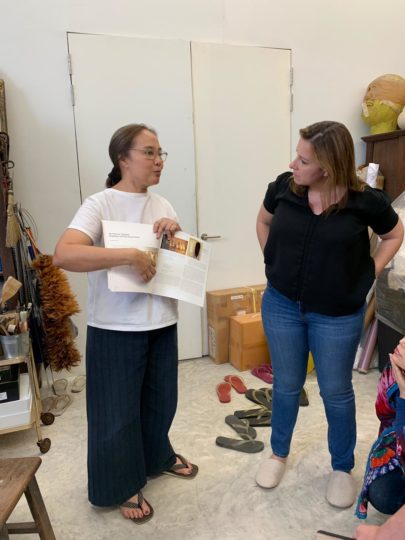
Pinaree Santipitak with Sofia Coombe
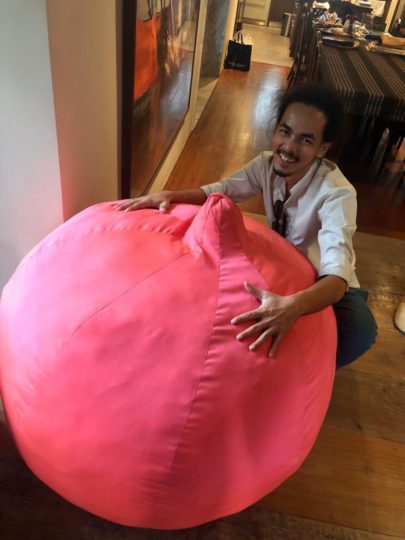
Reaksmey Yean with one of Pinaree’s stupas
Next stop on the trip was to the late Montien Boonma’s atelier, which is managed by his son. One of Thailand’s earliest known international artists, Boonma utilised sculptural works and installations to characterise how Thailand has moved away from an agrarian economy and culture, and more in the direction of industrialisation. His works are socio-political and spiritual, and are an amalgamation of local content and ready-made materials that investigate themes such as Buddhist teachings and the human experience. The entire space displayed Montien’s journey in art and life. His experience with natural materials played a huge role in his exploration of the human condition, the deterioration, the existence, and the disappearance. From prints to installation to dealing with topics of transcendence, Montien’s works allowed us to contemplate and reflect on the modern world we live in.
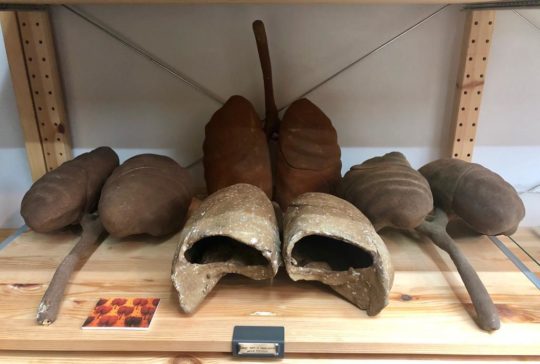
Montien Boonma’s studio
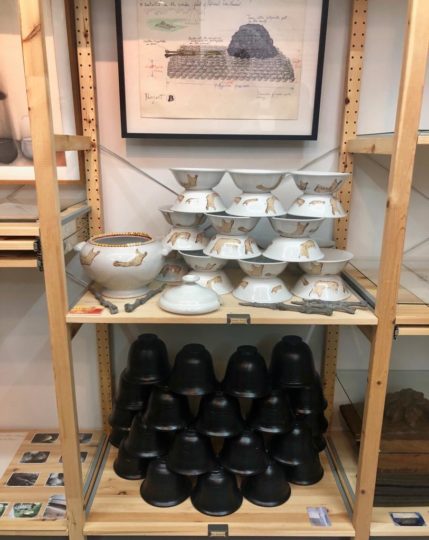
Montien Boonma’s studio
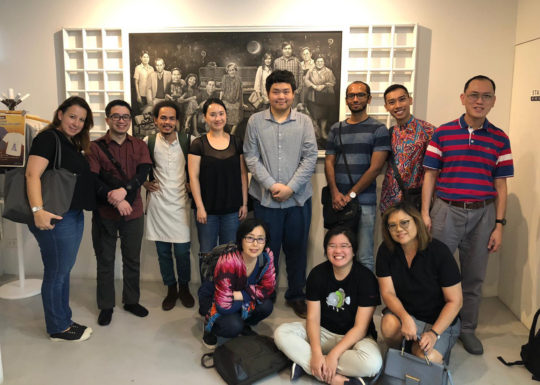
Montien Boonma’s studio
The following day we visited the epicentre of the BAB, the Bangkok Art and Cultural Centre (BACC). Upon entry into the lobby we encountered Happy Happy Project: Basket, a large-scale installation basket tower by South Korean artist Choi Jeong Hwa. Made of colourful plastic waste materials and massive in size, this installation ponders diverse readings from the perspective of environmental challenges.
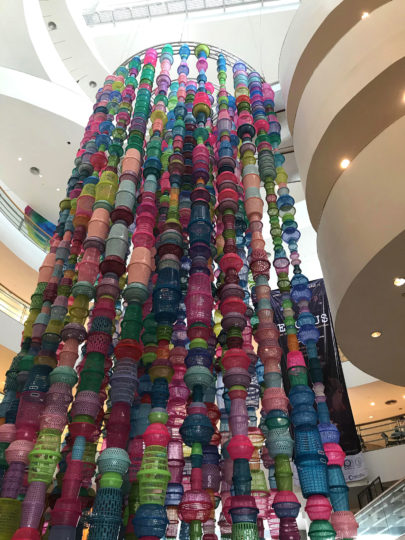
Choi Jeong Hwa, Happy Happy Tower, plastic baskets, dimensions variable, 2018
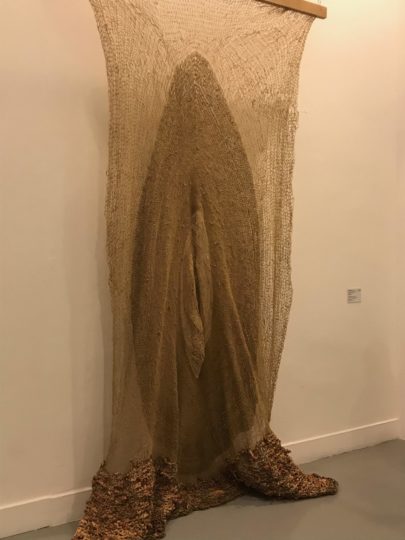
Muslimah Collective, Faith…Life, mixed-media, textile, and materials from nature, 180 x 120 cm, 2017
Imhathai Suwatthanasilp’s Good Girls Go to Heaven, Bad Girls Go Everywhere consisting of a set of two lightboxes, addressed the experience of sex workers in Chiang Mai. One box featured the mechanical parts from sewing machines wrapped in hand-woven knits which were made from the hair of the workers. These objects are meant to signify that society, and those involved in organising alternative jobs for sex workers, presume the workers to be happier than they would be in the sex trade. The second lightbox piece displayed thousands of moth wings glued on top of a light box, hanging on the wall with the phrase ‘Good Girls Go to Heaven, Bad Girls Go Everywhere’, as if to say that heaven belongs exclusively to ‘good’ people. Both the hair and moth wings denote the fragility of life.
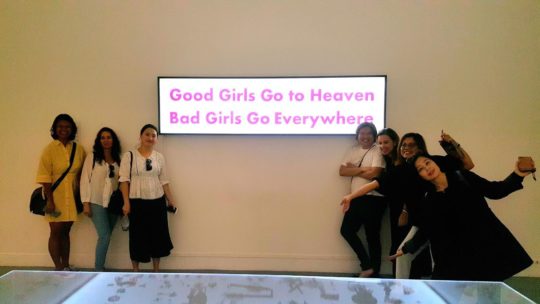
Imhathai Suwatthanasilp, Good Girls Go to Heaven, Bad Girls Go Everywhere, set of two lightboxes, dimensions variable, 2018
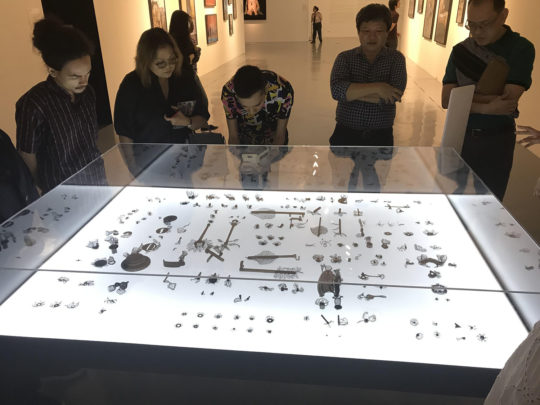
Imhathai Suwatthanasilp, Good Girls Go to Heaven, Bad Girls Go Everywhere, set of two lightboxes, dimensions variable, 2018
Sunanta Phasomwong’s mixed media installation, The State of Suffering (Mental Therapy) presented dark macabre sculptures that reflect sorrow, frustration, and family relationships. Using black wire as the primary material is a form of mental therapy for the artist. Her emotions are transformed into lines that swirl and overlap, resulting in shapes of human organs which seem strong, but are actually fragile and constantly changing. For her, the power of art unleashed can transform sorrow into happiness.
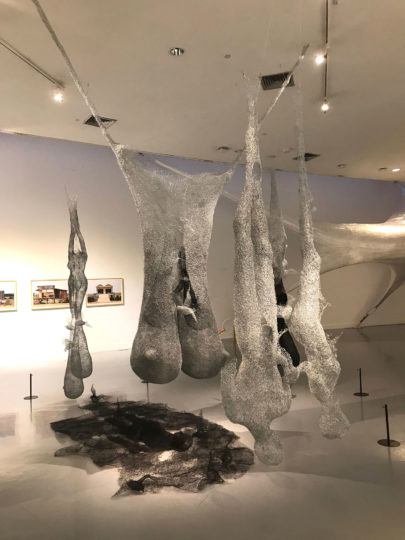
Sunanta Phasomwong, The State of Suffering (Mental Therapy), mixed media installation, dimensions variable, 2018
Some of the most interesting venues are site specific ones like temples, which included Wat Prayurawongsawas Waraviharn (Temple of the Iron Fence) where we saw the works of Nino Sarabutra and Krit Ngamsom. Nino’s vast installation What Will You Leave Behind? consisted of 125,000 small, unglazed, ceramic skulls arranged on the floor around the hallways at the entrance to the white bell-shaped stupa at the temple. Nino invited visitors to meander through the white corridors, where cremated ashes are stacked, and ask the life-affirming question: “If today was your last on earth, what will you leave behind?”. Turtle Religion by Krit was nestled amongst the flora, fauna, and peaceful pond, famous for its turtles and catfish. Juxtaposing his mixed media installations against this background with everyday found-objects, he presented a playful troupe of metal turtles carrying symbols of many beliefs on their backs. Depicting harmonious interreligious faiths and multiculturalism, the turtles are also emblematic of longevity and tolerance.
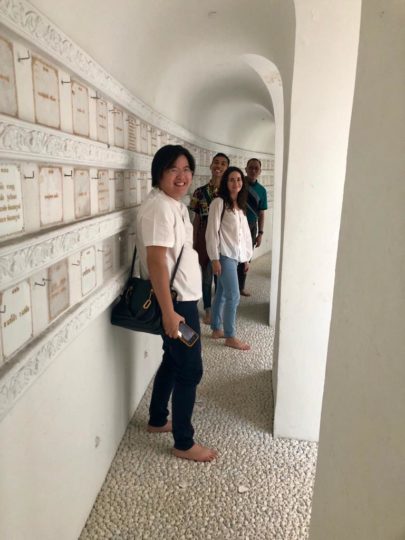
Nino Sarabutra, What Will You Leave Behind?, unglazed ceramic skulls, 125,000 pieces, 2018
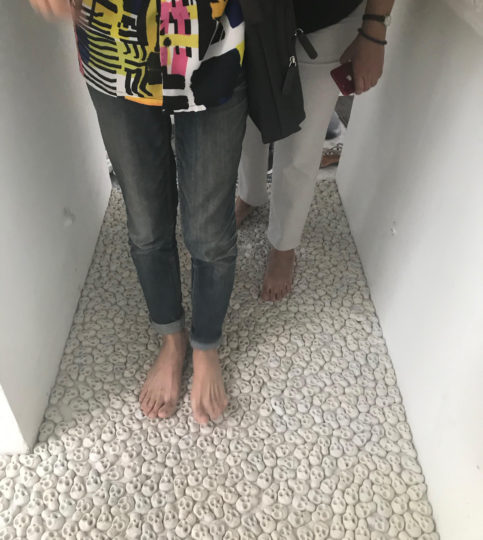
Nino Sarabutra, What Will You Leave Behind?, unglazed ceramic skulls, 125,000 pieces, 2018
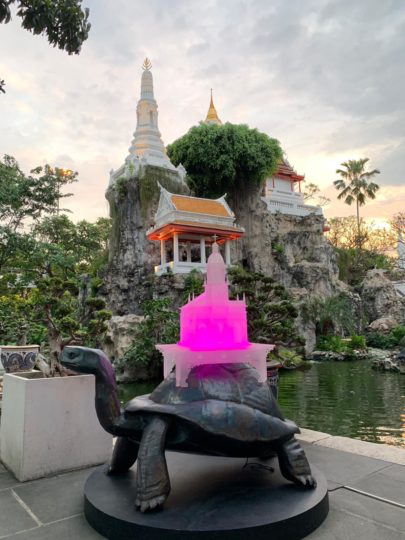
Krit Ngamsom, Turtle Religion, mixed media sculpture, dimensions variable, 2018
At the East Asiatique Building, Kata Sangkhae’s work focused on issues of urbanism, cultural environment and socio-political climates. In Companion Hands> – Happiness Mudr, a Kata casts his hands and arms employing body language as a means of interpreting the shape of the heart as an indication of both happiness and sorrow. The beating heart simultaneously embraces birth and death, freedom and dictatorship, bliss and violence.
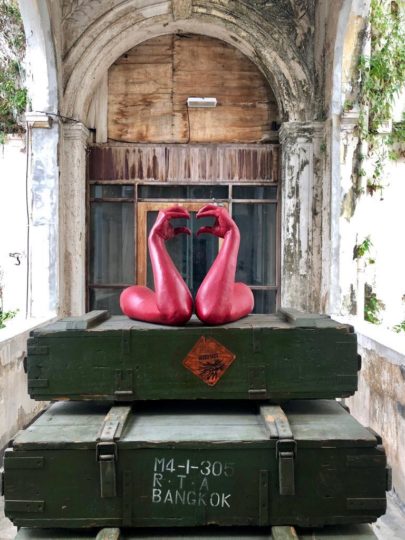
Kata Sangkhae, Companion Hands – Happiness Mudr, bronze casting and ammunition boxes, dimensions variable, 2018
University visits included stops at Silpakorn University and the Bangkok University Gallery. At the latter ,we were warmly welcomed by curator Ark Fongsut and given a tour of the Superbarbara: First and Foremost video installation series in a solo exhibition by Boonstri Tangtrongsin. The hand drawn animations are presented in videos that reflect on the world’s recurring problems, which never seem to be resolved. Different “episodes” highlight distinct problems, all of which are immediately and “universally recognisable not only because they are found everywhere, but because everywhere there is the same frustration for anyone who attempts to solve them,” according to the artist.
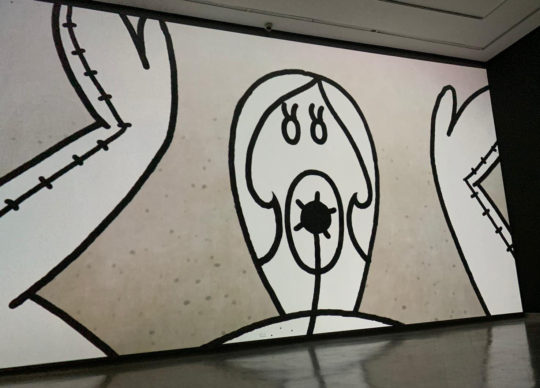
Boonstri Tangtrongsin, Superbarbara: First and Foremost, video installation

Boonstri Tangtrongsin, Superbarbara: First and Foremost, video installation
Other parts of the tour consisted of visits to commercial galleries including Nova Contemporary ,Gallery VER, WTF Gallery, and Richard Koh Fine Arts. Nova presented an immersive experience by Chatchai Puipia titled Vetal Suite: Curiosities Unearthed. An aquarium for the artist’s consciousness, the exhibition welcomed the spectator into a remake of his ethereal and eclectic home.
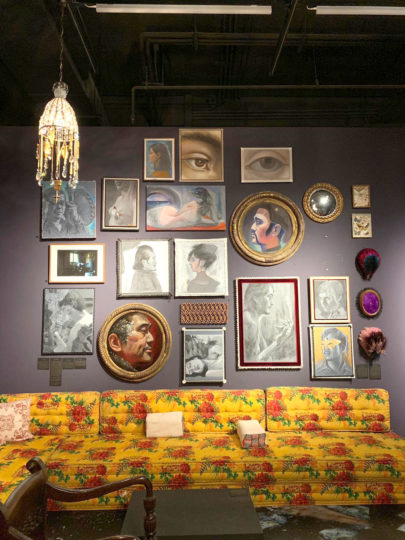
Chatchai Puipia, Vetal Suite: Curiosities Unearthed, mixed media, dimensions variable, 2018
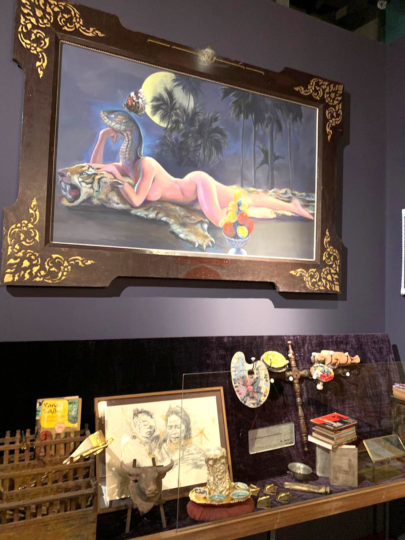
Chatchai Puipia, Vetal Suite: Curiosities Unearthed, mixed media, dimensions variable, 2018
A long awaited biennale, the newly launched Bangkok Art Biennale sincerely delivered on its mission to engage audiences. Although there was no time to see absolutely everything, it is obvious that the city has some of the best and most cutting edge of Southeast Asia’s contemporary art scene. From powerful installations to photography, Thai creatives presented themes of political resistance and social commentary, many in opposition to censorship, both subversive and obvious. The BAB is a true testament to the fact that when society is inhibited, it breeds true creativity and as industry practitioners and art enthusiasts, we look forward to Bangkok’s next biennale.

